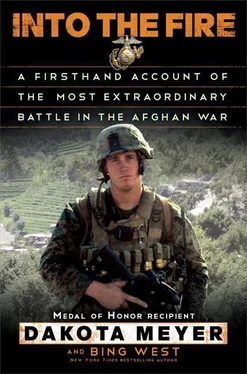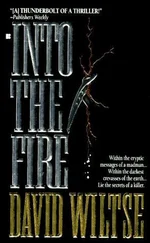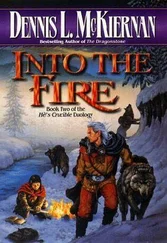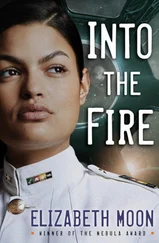
I had never seen anything like it. Five men taken down in five seconds. There was so much screeching and shooting that I couldn’t pick out the location of the weapon that shot them. To deliver such lethal grazing fire, the machine-gunner must have been hidden only a few hundred meters away, with a clear line of sight and his bipod firmly anchored. Yet whoever shot those men didn’t raise his gun sights and stitch me. I knew he was looking at me, but I couldn’t see him. There was nothing I could do. He let me live. Not one of his rounds even struck our truck. I can’t explain it.
We couldn’t see around the corners of the boomerang terrace walls, but Valadez, way up there, could see for us.
“They’re coming at you!” he yelled over the radio. “I can see them closing from both sides. They’re swarming you!”
In front of our truck, I saw a few guys sprinting across the wash from left to right, heads low. I don’t think they saw us coming up behind them, or heard the truck engine over the din of the gunfire. They scurried too quickly for me to get off a burst. Glancing to my right, I looked smack into the eyes of five or six men in dirty man-dresses, crouched alongside a drainage ditch, not ten meters away. When I gaped at them, they ducked down like they were playing hide-and-seek.
It took me a few seconds to realize they were spreading out to seal off the open end of the horseshoe valley, ziplocking the frozen Askars inside a fire sack. Rod and I had blundered into their rear.
We were bouncing over rocks no faster than a man can run when a bearded dushman clutching an AK leapt out of a ditch and sprinted after us, like a man trying to catch a bus. My gun almost wouldn’t swivel low enough to shoot him—the barrel was tilted down as far as it could go. I fired into his chest and he went down like he had hit a glass wall. A bullet doesn’t blow a man back like in the movies. Either he stumbles on or he falls dead. This man fell dead.
Rod was yelling at me—maybe I was hypnotized for a second by the death. There was a guy trying to open the right door. I couldn’t depress the .50-cal that low.
“I can’t get him!” I yelled. “The gun won’t go down enough!”
It takes the brain twelve thousandths of a second to react to danger. My mind was a complete blank. I had fired so many thousands of rounds that I didn’t think what I was doing. Once you’ve practiced a motion long enough, it becomes second nature. Some researchers call it “expertise-induced amnesia.” Athletes call it “being in the zone.” I call it self-preservation. I grabbed my M4, leaned out, and shot the guy four or five times in the shoulder and the neck. It was like shooting a zombie. There was no shock power in the little 5.56-millimeter bullets. He fell to the ground.
I pivoted back to the .50-cal and grabbed the spade handle. The weapon, my hands, and my eyes were working as a trained unit, independent of my brain. Man, sight picture, shoot . You don’t really look at the target. The enemy remains out of focus; you concentrate on the sight picture. Man, sight picture, shoot . I hit one or two guys next to the truck and the others ducked back into the ditch.
Valadez came back on the radio.
“Rod, watch your front!”
Rod was focused on keeping traction in the loose gravel. If the truck got stuck, even for a moment, we’d be toast. He looked ahead to see a bearded, hatless man in his mid-thirties, dressed in brick-red man-jams with a green chest rig full of ammo, running toward the truck and firing an AK at us from his hip.
“Hold on, Homey!” Rod yelled.
He hit the accelerator. The truck hit the man squarely in his chest. There was a bump, and then another bump under the tires.
“Holy shit!” Rod yelled. “I just ran over a guy.”
“Back up and do it again!”
Ducking our firepower, the dushmen were pulling back into the terraces, jumping behind the walls, turkey-necking out to shoot at our blind spots. All had beards and none looked young. Most wore dirty clothes—some with Afghan Army trousers showing underneath. Many wore green chest rigs for ammunition and Afghan Army helmets. I would have shot more of them if I didn’t have to look twice to make sure they weren’t our guys.
A few hundred meters behind us, a monster-big Blackhawk was setting down in a terrace. I could see the blades turning and supposed it was a medevac. If the dushmen had the brains to ignore Rod and me and fire in the other direction, it would be a mess. The chopper was an easy mark for an RPG. I sprayed in a wide arc around the terraces to my right. I wasn’t aiming; I just wanted the assholes to keep their heads down and their jihad thoughts on us. That chopper took off almost as soon as it landed—a great evac job by ballsy pilots.
The Askars remained frozen in the wash. We were all going to die if they stayed where they were and didn’t fight back. We could maybe hold open the neck in the bottle for them to escape—if they would fight for it. Valadez kept shouting warnings to us, as I concentrated on shooting to my right and to the front. For every fifty rounds I was pumping out, we’d get two hundred back, including RPG rounds. One exploded about fifteen meters to our right front. Somehow the shrapnel didn’t shred our front tire. I scanned the hills and the houses for the dust raised by the back blasts of the RPG tube—no luck. Some 107 rockets were mixed in, or maybe a recoilless rifle.
Rod was jerking the truck around to avoid their fire, but they couldn’t miss us forever. I knew it wouldn’t be a bullet; a red-hot chunk of jagged shrapnel would rip off my face, leaving it up to Rod to get out alone.
My sweaty right hand kept slipping off the gun’s handgrip and butterfly trigger. When I wiped the sweat away, I realized it was red. I ducked down in the turret, letting my right arm dangle, to grab a bandage.
Rod looked at me in a startled way.
“You okay, man? You hit?”
“Yeah, yeah, I’m fine. Sweating like a pig is all. Go. Go.”
I had been shot above the elbow—a bleeder that did no damage. The bone was fine. In a fight, adrenaline deadens the pain. I did a little wrapping and got back to shooting.
I had no idea where to go. My team was up ahead somewhere and out of radio contact. Each whoosh of an incoming RPG still caused me to involuntarily flinch. The air was sizzling and I had to scream for Rod to hear me.
“Do you see the team?”
“Negative!”
It was after eight in the morning and I was out of ideas. Then two small OH-58 Kiowa helicopters skimmed around my turret. The two-person Kiowa is about the size of an Austin Mini. It carries about two hundred rounds of .50-cal and a few small rockets. Think of an airborne motorcycle or an angry wasp.
The frustrated Kiowa pilots had been listening on their radios for the last forty minutes while Joyce dithered. Now that they’d been turned loose, the pilots couldn’t do enough to help us. They’d provided the cover for Swenson’s Command Group to get out of the wash, and now they were hovering above me. With my handheld, I made contact.
“This is Fox 3-3. I can’t find my team. Four Marines are missing up in that village. I don’t have a grid or radio contact with them.”
“Three-3, this is Pale Horse,” the pilot said. “Roger. We’ll stay with you. Give us a vector.”
“Pale Horse, the heaviest fire is coming from that white schoolhouse, grid 972 678.”
“Three-3, we got it. Be right back.”
The two Kiowas peeled off to the southeast and poured their remaining rockets into the schoolhouse. They then darted forward and buzzed back and forth over South Ganjigal. Dark smudges of smoke burst around them—the dushmen were using their RPGs as antiaircraft weapons.
Читать дальше













